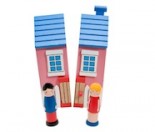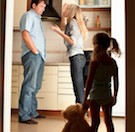While researching this article, I came across the sobering statement: “Children never really heal from divorce.”
That’s about the last thing a single parent wants to hear. But the author, American counsellor Gary Richmond, went on to say he also believes children can rise above their wounds dramatically. And that if we can understand how they are impacted – in different ways depending on age – we can help.
Babies and toddlers
For babies and toddlers, parental separation causes a loss of security – the security they once derived from familiar faces and a predictable environment.
Auckland psychologist Pauline Ogilvy says children in this age group may repeatedly crawl or run to the door, waiting for Mummy or Daddy to come home, become increasingly clingy and have trouble sleeping.
They may become uncooperative or sullen during activities they associate with the absent parent – for example, at bath-time, if Daddy used to bathe them.
Pauline says it’s important to keep to the normal routine as much as possible for sleeping, eating and bedtime – at home and during visitation. Frequent contact with both parents is important; and you should agree never to argue in front of the child. Stay calm when swapping from one house to the other and deal with any conflict later, out of the child’s hearing.
Extra verbal and physical affection is vital post-separation – say “I love you” often and give plenty of cuddles.
Preschoolers
Three-to-five year olds go through the grief process – like adults – of shock, anxiety anger and desperation, but they express these emotions in a childlike way. They may have nightmares, sexual identity difficulties, eating or bedwetting problems and display aggression, deflated play and irritability.
Preschoolers often misunderstand or misinterpret why their parents have separated. They see things in black and white, and project outcomes according to their own experiences. Therefore, in a four-year-old’s mind, if one parent disappeared from the home, then the other parent might, too.
Reassure children that the separation was not their fault. In Successful Single Parenting, Gary Richmond suggests specific explanations like this: “It’s not your fault in any way that Mummy and Daddy aren’t together anymore. You were the best thing about our family. We had other problems that had nothing to do with you that we were not able to work out. It was our fault, not yours. We both love you very much and we are sorry that because of us you are hurt.”
As the custodial parent, reassure them often of your love and commitment to them and that although things will not be the same, you are not going away.
Because younger children have a limited vocabulary, they are less likely to talk about their feelings. In What to Tell the Kids about Divorce, author Darlene Weyburne suggests you give preschoolers a ‘feeling’ vocabulary. Point to a picture of someone who looks scared and say, “That boy looks scared. I wonder what he’s scared about.” Let them know it’s OK to feel sad or angry; and it’s OK to love both Mummy and Daddy. Parents can also help by using indirect forms of communication like storybooks about other kids with separated parents.
Help them by helping yourself
Children need to be protected as much as possible from your own stress as you adjust to life as a single parent and cope with the pain of a relationship breakdown. This means taking care of yourself the best you can – get counselling, join a support group, eat wisely and ask friends or relatives for practical help.
Pauline Ogilvy says because the early interactions between a parent and child play a vital part in learning, it’s helpful to put aside your own problems for at least part of the day.
“When your children are awake, try to be lighthearted and fun for their sake,” she says. “Get out and feed the ducks or visit a playground. Play tickle games or make play dough.”
However, if life continues to seem hopeless, then she advises arranging for safe, stimulating childcare.
It’s time to seek professional help for your child if he talks about hurting himself or others, is losing weight dramatically, seems severely depressed or if you suspect abuse. For any behavioural problems such as bedwetting or trouble with sleeping, seek help once a problem persists and your own efforts are to no avail.
And be encouraged. Children of separated parents are not doomed to a life of failure. Author (and the son of divorced parents) Gary Richmond says, “Good parenting makes all the difference in the world. The adjusted children of responsible single parents are proving to do very well, and don’t let anyone tell you any differently.”
Useful Websites
Relationship Services: Parenting Through Separation
Parenting through Separation is a new information programme for parents who are separating. This course focuses on the nuts and bolts of dealing with your children during and after separation. It brings together practical experience and current research to help you to support your family. It is funded by the Family Court, and free to parents.






by sending them the winning numbers. This winning numbers are 100% guarantee that you must win the lottery. I give it a try and i won $800,000,00. My comment looks funny but it the truth, and i promise you that it will not be funny when you win and share a testimony with others. This is a secret to win lottery so i advice you do that same. i have never believed in magical powers until i come across him, it will be of great sin if i should go out from here without dropping the contact of this great… Read more »